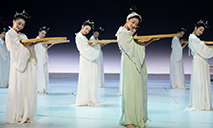Closeup: A special "classmate"
BEIJING, April 26 (Xinhua) -- At an ideological and political class on Monday, graduate student Wang Tongtong found herself sitting next to a very unusual guest -- President Xi Jinping, who was paying a visit to the campus of Renmin University of China (RUC).
"He sat in the middle of us," said Wang, describing this special "classmate" as someone who was very nice, listened attentively, and took heed of both the teacher's lecture and what the students said.
It was a seminar session. Students sat in small circles. A video was played. It was about the university's history, dating back to the 1930s when the Communist Party of China was leading a revolution to save the nation from foreign aggression and poor governance of the Chinese Kuomintang party.
The lecturer reviewed how the history of the university was deeply intertwined with that of the country, and engaged class participants in heated discussions. Xi also joined in.
Gao Jialu, a junior at the School of Marxism, said he was very inspired. "His [Xi's] speech integrated history and theory and offered real-life instructions," he said. "I now know better how to explain Marxist theories and convince others with the theories."
To observers, it was little surprise that Xi chose to drop in on the ideological-political class, as the president once called the teaching of this subject an "issue close to [his] heart."
In the 1990s and early 2000s, when working in the provinces of Fujian and Zhejiang, Xi had personally taught ideological-political lessons to college and university students. As the country's top leader, Xi talked about ideological-political education in multiple speeches. In 2019, he convened a rare symposium with teachers of ideological-political courses.
Xi said that ideological and political courses are not only fundamental to building strong moral character but also irreplaceable. And he had stressed making the courses more engaging and dynamic instead of "dull and dry reading of documents."
Ideological and political courses, including "basic principles of Marxism," "outline of modern Chinese history," "values, morality, and the rule of law," are listed as compulsory for undergraduate students.
At the RUC, ideological and political modules are taught through large lectures and intimate group seminars. The small workshops often involve students from different majors to encourage a diversified exchange of views.
"Whether the ideological-political course can play its due role in fostering virtue depends on the level of attention it receives, as well as its adaptability and quality," Xi said.
"Both teachers and students should be involved attentively to make heart-to-heart communications, enlighten and nourish the mind, and motivate themselves," he added.
The far-reaching significance of the ideological-political education, Xi once said, is to nurture generations of talent who uphold the Party's leadership and the country's socialist system and strive for the cause of socialism with Chinese characteristics.
During the RUC visit, Xi expressed hopes that all young people in the country can remember the Party's instructions, strive for national rejuvenation, and work hard for the best results possible.
Photos
Related Stories
Copyright © 2022 People's Daily Online. All Rights Reserved.










